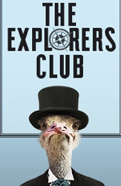Nell Benjamin on Laughing at Bullies & the Sentimental Inspiration Behind Her Play The Explorers Club
About the author:
Nell Benjamin co-wrote music and lyrics for Legally Blonde, which earned her and her husband, Laurence O’Keefe, a 2007 Tony Award nomination for best score. Benjamin and O'Keefe began collaborating while attending Harvard together, and their shows include The Mice, Sarah, Plain and Tall, Cam Jansen, and Huzzah! Along the way, she has won a Kleban Award and a Jonathan Larson Award and served as a staff writer on the TV series Unhappily Ever After. Benjamin's new play The Explorers Club, starring John McMartin, Jennifer Westfeldt, Arnie Burton and Lorenzo Pisoni, opens on June 20 at Manhattan Theatre Club's off-Broadway home, New York City Center Stage I. Set in London in the late 1870s, the play centers on the members of the prestigious Explorers Club in the midst of a crisis: their acting president wants to admit a female. Below, Benjamin shares the origins of this world premiere comedy, including how explorers were the rock stars of the 19th century.
![]()
I wrote a play about explorers because in the Victorian era in which the play is set, they were like rock stars. Newspapers would pay for their stories and even send them out to make discoveries, the same way papers now will pay for some celebrity’s wedding or baby photos. The story of a woman trying to break into their ranks is very fraught because she not only wants to be a scientist but she also wants to be a rock star. I thought that would be the toughest group for her to break into.
Some of this play is based on the experiences of friends of mine who are talented scientists who had a terrible time because of outdated notions of what women can and can’t do. I say they’re outdated but I know people still have them today. I suppose that's a theme of my writing, but I wouldn’t say it’s because I’ve been terribly oppressed. I’ve been extraordinarily lucky, but for every moment when I did have to deal with complete idiocy, there is a moment in the show we all get to laugh at.
I don’t think this is purely a “woman thing,” by the way. We’ve all had to put up with judgments by other people. There are unfortunate times in life when you have to suck it up and be polite to people you think are being thoroughly unreasonable and stupid. That is something that translates across the board. To me, it’s kind of fun to make bigots and bullies into big, cheerful idiots so that we can laugh at them. I didn’t get the opportunity to laugh at them when it was happening to me, but now I do and I’m enjoying it thoroughly.
Generally, if you ask even the most unreasonable of people, “How do you feel about women or people who are different from you?”, they will say the right things, but they don’t necessarily feel the right things. But if you can get an audience to laugh at unreasonable people, then you can get them to feel the right thing—to feel like those guys are ridiculous and should be mocked, not indulged or followed. I feel that a play like The Explorers Club can change your mind in a way that a forceful letter to The New York Times about how such-and-such a thing was insensitive cannot.
I’m also a big fan of British comedy, which I watched a lot of while growing up. I love the shows where everyone has to act polite and proper, but then they get away with doing and saying so much incendiary stuff.
The Explorers Club is a comedy because…why not? I like the spoonful of sugar. I’m not very good with plays where I can’t have the sugar because the medicine is so good for me. I feel like we can make the point we want to make and still have some slapstick and fun and have it work on several levels. The preview period has its own rhythm, and we have some of the most preeminent comedians I have ever encountered. They’ve really gotten in and played in the sandbox.
I hope audiences find the play equally funny and smart ,because I like it to fire on all cylinders. There are rarified jokes about science and pseudo-science, and there are also the falling down and slinging-glasses-around jokes. I hope they walk out of the theater with a fresh sense of perspective about this period when science was a battleground between people who wanted to know what real science was and egotistical, wealthy amateurs who used science to reinforce their own beliefs. Even today, we have this issue of trying to get past our old biases in science, as in life. Setting a play in that period makes us think about it today. An attitude toward progress is useful to everyone, not just women, not just playwrights—everyone. We have to move forward.
